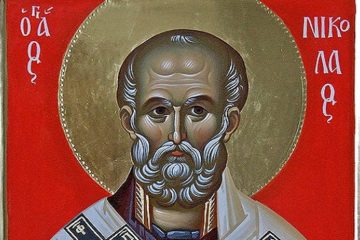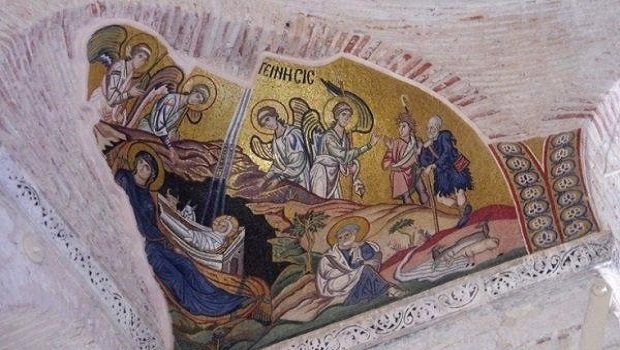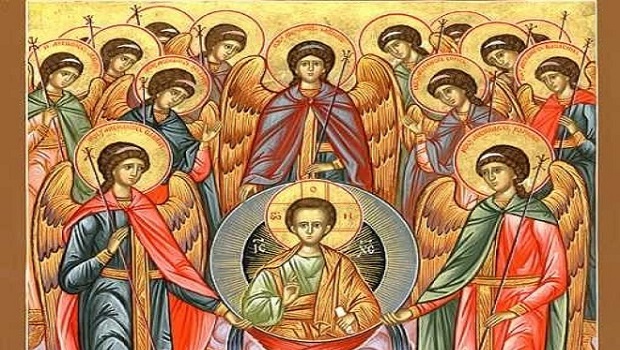Archimandrite Zacharias Zacharou
‘I will give unto him that is athirst of the fountain of the water of life freely’[1].
During Great Lent, to a certain degree, we taste of Christ’s death. In the middle of this period, the Church institutes the Veneration of the Precious Cross, to quicken inspiration and strengthen us in our struggle to be vouchsafed to enter into the life-giving presence of the Risen Lord. We are reminded that it was through the Cross that joy and the Resurrection came into the world. In the middle of the period of the Pentecostarian, we celebrate Midpentecost, which ignites our thirst for the Light of the Comforter, and confirms our determination, so we persevere in prayer with ever-increasing yearning, ‘until we are clothed with power from on high’[2]. Midpentecost is the prelude of feast of Pentecost, when the Lord will satisfy our soul’s hunger, ‘when we see His likeness’[3].
Our God is a God of Comfort. God the Father is ‘the Father of mercies, and the God of all comfort’[4], the Son of God, Christ, is the first Comforter, Who sends into the world the other Comforter, the Holy Spirit[5]. The God of Christians, Father, Son, and Holy Spirit is a God of mercy, a God of consolation, a God of comfort. But how does this consolation reach man? How can the power of God attend clay? Our answer has been given already by the Prophet David: ‘a broken and a contrite heart, O God, thou wilt not despise’[6]. Our God has a weakness; he bends down over those with a painful heart, who cry to Him. He is the God of mercy and that is why He easily draws nigh unto those who bear a wound in their chest, who have a thirsting spirit and long for His incorruptible consolation and succor.
The human heart is a small thing, but the whole world cannot satisfy it. Man’s heart is the throne of the great King, the place where the eternal day dawns and the day star without eventide arises[7]. When the day of the Lord shines through in the heart, then the true man starts a new life, ‘going forth unto his work until the evening’[8].
All Holy Scripture, from the Old Testament to the book of Revelation, speaks about the water of eternal life, about the soul’s thirst for God, which is quenched only with His gift. Ancient Israel knew how to raise its thirst from the physical to the spiritual level. In the desert it transformed its natural thirst into the soul’s thirst ‘for the Living God’[9]. The promises of Israel referred to a time when the chosen people ‘with joy’ would draw water ‘out of the wells of salvation’[10]. The Lord promised the messianic water, that is the bliss of His blessed and perfect Kingdom, through His words: ‘If any man thirst, let him come unto me, and drink’[11]. He Himself is the fulfilment of His promises, the Lamb who shepherds His chosen and ‘shall lead them unto living fountains of waters: and God shall wipe away all tears from their eyes’[12].
The troparion of Midpentecost renders the meaning of this period beautifully. It perfectly expresses the anguish and longing of the soul, who even when she is attacked from every side by the despondency waging war against the children of this age, turns with all her strength towards the Lord, seeking His mighty help, and the only thing that she desires is the gift of the Holy Spirit, so to be able to hymn the Lord worthily.
‘In the midst of the feast, give my thirsty soul to drink of the waters of godliness. For Thou didst cry unto all O Saviour,: ‘If any man thirsts, let him come to Me and drink!’ O Christ our God, wellspring of life, glory be to Thee’[13].
Christianity is not something neutral. It promises nothing less than the union of man, made of earth and bound by time, with the infinite God. We would be much benefitted, if we could make words like these our personal prayer, or if, as preparation to celebrate Pentecost in a manner well-pleasing to God, we could read slowly and carefully Psalm 118 every day, allowing its words to pierce our very being. This Psalm expresses and cultivates the insatiable thirst of man for union with the Holy of Holies, as it puts in words the confession of the soul who longs ‘to depart and be with Christ’[14], the confession of the soul who longs to be transported from ‘things very sorrowful unto things most good and full of delight’[15], from this temporary and vain life, to the eternal and abundant life of the Kingdom of God.
In order that man’s expectation for the gift of Pentecost may remain constant, yet also always increasing, he must keep his mind fixed on the coming of the Lord and wait upon Him. He must not lose heart in prayer that he may be vouchsafed to ‘stand before the Son of man’[16]. The early Christians had great inspiration, because they expected the presence of the Lord and for them His coming was imminent. This was why they prayed: ‘Let Thy grace come, and this world pass away’[17]. They knew that the grace of the Risen Christ is the Kingdom of God, and they had such yearning for its coming, that they ended their prayer saying, ‘Come, Lord Jesus.’ They did not wait passively, in despondency, but called upon Him to come quickly. Not only did they call upon Him, but ‘hasting unto the day of the Lord’[18], they ran towards the Lord, speeding His presence. Their expectation for the coming of the Kingdom of God was so strong, that it overshadowed everything and clothed them with the courage to be led to martyrdom. Through the blood of those martyrs and the tears of the Saints, and due to all their prayers and intercession, the Christian faith was founded and preserved upon earth.
Let us prepare to approach the great and final feast of Pentecost trusting that the Lord Jesus Christ will not forget even us, but will visit us and send us the gifts of His goodness. As He says in His Gospel: ‘If ye then, being evil, know how to give good gifts unto your children: how much more shall your Heavenly Father give the Holy Spirit to them that ask him?’[19], so as to lead them into ‘an upright land’. With the Lord’s promise and His incorruptible word as ‘a sure and steadfast anchor of the soul’[20], let us surrender to the earthquake of the energy of His Spirit, casting off the scales of sin and mortal decay, so we may turn with all our heart towards the Lord and receive the ‘fiery and dew-laden’ gift of our Great God, which will convey us away from the ephemeral and delusory so we may attain to that which is eternal and true. Then we will know that we are children of the Heavenly Father and that He has prepared a great inheritance for us, the Kingdom of Heaven. For unto us the promise[21] of the Father and the Son and the Holy Spirit is given. Amen.
[1] Rev. 21:6.
[2] See Luke 24:49.
[3] See Ps. 16:15 (LXX).
[4] 2 Cor. 1:3.
[5] John 14:16-17.
[6] Ps. 50:19
[7] See 2 Peter 1:19.
[8] See Ps. 103,23.
[9] Ps. 41,3.
[10] Isa. 12:3.
[11] John. 7:37.
[12] Rev. 7:17.
[13] Troparion of Midpentecost.
[14] Phil. 1:23.
[15] Vespers, Day of the Holy Spirit, Sixth prayer of kneeling.
[16] See Luke 21:36.
[17] The Apostolic Fathers, Didache, Οἱ Ἀποστολικοὶ Πατέρες, Διδαχή, Ἐκδ. οἶκος Ἀστήρ, Ἀλ. καὶ Ε. Παπαδημητρίου, Ἀθῆναι 1953, παρ. 10, στίχος 6, σ. 18.
[18] See 2 Peter 3:12.
[19] Luke 11:13.
[20] Heb. 6:19.
[21] See Acts 2:39.
Source: pemptousia.com




0 Comments